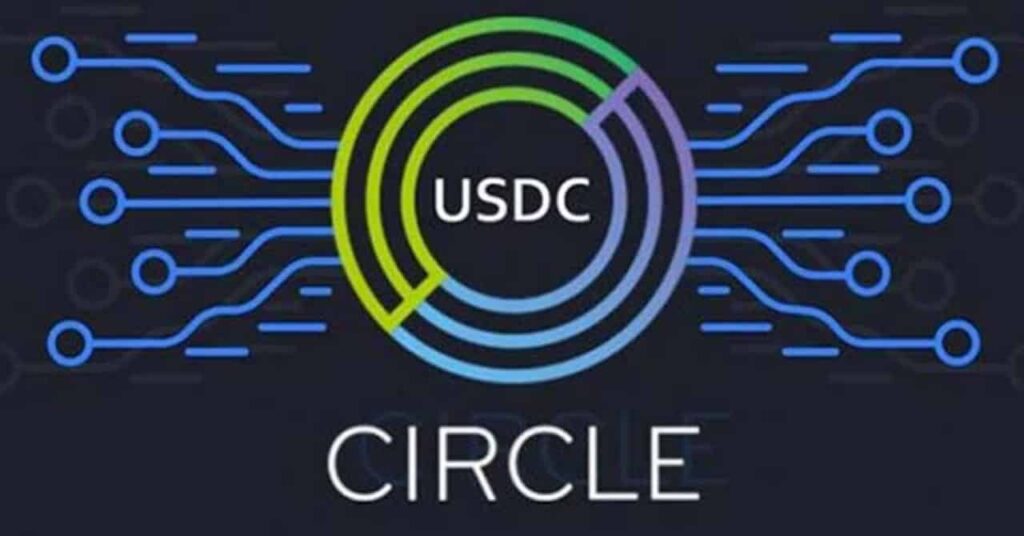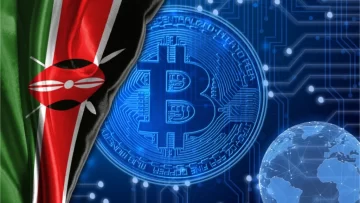- Circle has announced its decision to cease support for its USDC token on the Tron blockchain network.
- USDC stablecoin is the seventh-largest crypto token, at the time of writing, with approximately $28 billion in circulation.
- Israel’s National Bureau for Counter-Terror Financing (NBCTF) has seized numerous Tron wallets.
In a significant move, Circle, a major player in the U.S. crypto space, has announced its decision to cease support for its USDC token on the Tron blockchain network. The decision, disclosed on Wednesday, reflects Circle’s commitment to maintaining the integrity and safety of its USDC stablecoin, aligning with its ongoing efforts to ensure transparency and trust in the digital asset realm.
Based in Boston, Circle outlined in a blog post that, effective immediately, it will discontinue the minting of USDC tokens on Tron, a rapidly expanding platform known for facilitating the transfer of stablecoins. This strategic shift comes amidst regulatory challenges faced by Tron’s founder in the United States, underscoring Circle’s vigilance in evaluating the suitability of blockchain networks supporting USDC.
While Circle did not explicitly specify the rationale behind its decision, it emphasized its continuous assessment of blockchain platforms within its risk management framework. Until February 2025, institutional clients can transfer their USDC holdings from Tron to other compatible blockchains or redeem them for traditional currency. Likewise, retail customers can seamlessly transfer USDC to alternative blockchains or redeem them through crypto exchanges and brokerages.
Circle Fintech Shifts Strategy: Ends Support for USDC Stablecoin on the Tron Network.
Tron, known for its ambitious vision of becoming the world’s leading decentralized financial protocol, remains undeterred by Circle’s decision. A spokesperson for Tron reiterated the network’s commitment to progress, emphasizing its ongoing trajectory.
This latest development follows Circle’s actions last year, wherein it terminated accounts associated with Tron founder Justin Sun and his affiliated entities. Sun, a prominent figure in the crypto space, faced legal action from the Securities and Exchange Commission (SEC) over allegations of artificially inflating trading volumes and selling Tron tokens as unregistered securities—a claim Sun vehemently refuted.
It’s important to note that Circle’s decision primarily impacts USDC on the Tron blockchain network and does not directly target individual users or related entities.

USDC, the seventh-largest crypto token, at the time of writing, with approximately $28 billion in circulation, holds a substantial presence in the digital asset landscape. Circle’s strategic realignment demonstrates the company’s commitment to upholding regulatory standards and mitigating associated risks, as evidenced by its hosting of $335 million worth of USDC on Tron.
Recent investigations and analyses shed light on Tron’s emergence as a preferred platform for crypto transfers linked to designated terror organizations by several nations, including Israel and the United States. The platform’s faster transaction times, lower fees, and stability have made it an attractive option for illicit activities, as highlighted by financial crime experts and blockchain investigation specialists.
Israel’s National Bureau for Counter Terror Financing (NBCTF) has seized numerous Tron wallets believed to be associated with “designated terrorist organizations” or involved in “severe terror crimes.” The surge in Tron-related seizures underscores the evolving landscape of crypto-enabled illicit activities and the challenges law enforcement agencies face in combating them effectively.
Also, Read DN-404 Tokens: Addressing Ethereum Congestion Through Dual-Contract Ingenuity.
While the precise extent of illicit funds routed through crypto networks remains challenging to ascertain, the increased scrutiny of Tron reflects a broader trend within the digital asset ecosystem. Tether, the world’s largest stablecoin, also plays a significant role in Tron transactions, further complicating efforts to monitor and regulate crypto-related activities on the network.
Despite Tron’s rapid growth and ambitious aspirations, concerns regarding its association with illicit activities have diverted its trajectory. The platform’s allure, characterized by faster transaction times and lower fees, has inadvertently attracted nefarious actors seeking to exploit its features for illicit purposes. The surge in Tron-related seizures by law enforcement agencies underscores the urgent need for enhanced scrutiny and regulatory oversight within the crypto space.
The evolving landscape of crypto-enabled illicit activities poses significant challenges for regulatory bodies and law enforcement agencies worldwide. While blockchain technology offers transparency and traceability, it also presents unique challenges in identifying the beneficiaries of transactions. The pseudonymous nature of crypto transactions and the proliferation of privacy-focused cryptocurrencies further complicate efforts to combat financial crimes effectively.
Furthermore, the emergence of stablecoins, such as USDC, as a preferred medium of exchange within the crypto ecosystem adds another layer of complexity to the regulatory landscape. While stablecoins offer the benefits of price stability and faster settlement times, their potential misuse for illicit activities has raised concerns among regulators and policymakers. As a result, regulatory scrutiny of stablecoin issuers and their associated blockchain networks has intensified in recent years.
In response to these challenges, industry stakeholders have recognized the importance of collaboration between regulators, law enforcement agencies, and crypto companies to address illicit activities effectively. Implementing enhanced due diligence procedures, robust compliance frameworks, and real-time transaction monitoring helps mitigate risks and uphold the integrity of the digital asset ecosystem.
Regulatory bodies and law enforcement agencies are intensifying efforts to address illicit activities in the crypto space, compelling stakeholders across the industry to adopt stringent measures to mitigate associated risks. Circle’s decision to discontinue USDC support on the Tron network underscores the importance of proactive risk management and regulatory compliance in fostering trust and sustainability within the digital asset ecosystem.
Also, Read Celsius Network was cleared from bankruptcy by the US Bankruptcy Court.
- SEO Powered Content & PR Distribution. Get Amplified Today.
- PlatoData.Network Vertical Generative Ai. Empower Yourself. Access Here.
- PlatoAiStream. Web3 Intelligence. Knowledge Amplified. Access Here.
- PlatoESG. Carbon, CleanTech, Energy, Environment, Solar, Waste Management. Access Here.
- PlatoHealth. Biotech and Clinical Trials Intelligence. Access Here.
- Source: https://web3africa.news/2024/02/28/news/circle-ceases-usdc-support-tron/
- :has
- :is
- :not
- 1
- 2025
- 7
- a
- Accounts
- across
- Action
- actions
- activities
- actors
- address
- addressing
- Adds
- adopt
- Affiliated
- agencies
- aligning
- Allegations
- allure
- also
- alternative
- ambitious
- amidst
- among
- an
- Analyses
- and
- announced
- Another
- approximately
- ARE
- AS
- assessment
- asset
- associated
- Association
- At
- attracted
- attractive
- Bankruptcy
- BE
- becoming
- behind
- believed
- beneficiaries
- benefits
- between
- Billion
- blockchain
- Blockchain network
- Blockchain networks
- blockchain technology
- blockchains
- Blog
- bodies
- boston
- broader
- brokerages
- Bureau
- by
- CAN
- cease
- challenges
- challenging
- characterized
- Circle
- Circulation
- claim
- clients
- collaboration
- combat
- combating
- comes
- commission
- commitment
- Companies
- Company’s
- compatible
- compelling
- complexity
- compliance
- Concerns
- congestion
- continuous
- Counter
- Crime
- Crimes
- crypto
- crypto companies
- Crypto ecosystem
- Crypto Exchanges
- crypto space
- crypto transactions
- cryptocurrencies
- Currency
- Customers
- decentralized
- decision
- demonstrates
- designated
- Development
- DID
- digital
- Digital Asset
- digital dollar
- diligence
- directly
- does
- Dollar
- due
- ecosystem
- Effective
- effectively
- efforts
- emergence
- emphasized
- emphasizing
- ending
- ends
- enforcement
- enhanced
- ensure
- entities
- ethereum
- evaluating
- evidenced
- evolving
- exchange
- Exchanges
- expanding
- experts
- explicitly
- Exploit
- extent
- Face
- faced
- facilitating
- faster
- Features
- February
- Fees
- Figure
- financial
- financial crimes
- financial-crime
- financing
- fintech
- First
- follows
- For
- fostering
- founder
- Framework
- frameworks
- from
- funds
- further
- Growth
- Have
- helps
- High
- Highlighted
- his
- Holdings
- holds
- hosting
- HTTPS
- identifying
- illicit
- immediately
- Impacts
- implementing
- importance
- important
- in
- inadvertently
- Including
- increased
- individual
- industry
- inflating
- Institutional
- institutional clients
- integrity
- intensified
- intensifying
- investigation
- Investigations
- involved
- Israel
- Issued
- issuers
- IT
- ITS
- jpg
- Justin
- Justin Sun
- known
- landscape
- largest
- Last
- Last Year
- latest
- Law
- law enforcement
- layer
- leading
- Legal
- Legal Action
- light
- linked
- lower
- Lower Fees
- made
- Maintaining
- major
- management
- many
- max-width
- measures
- medium
- medium of exchange
- million
- minting
- misuse
- Mitigate
- mitigating
- Monitor
- monitoring
- move
- National
- Nations
- Nature
- Need
- network
- networks
- note
- numerous
- of
- offer
- Offers
- on
- ongoing
- Option
- or
- organizations
- Other
- outlined
- over
- Oversight
- platform
- Platforms
- plato
- Plato Data Intelligence
- PlatoData
- player
- plays
- policymakers
- poses
- Post
- potential
- precise
- preferred
- presence
- presents
- price
- primarily
- prioritizes
- Proactive
- procedures
- Progress
- prominent
- protocol
- purposes
- raised
- rapid
- rapidly
- rationale
- real-time
- realm
- recent
- recognized
- redeem
- reflects
- regarding
- Regulate
- Regulators
- regulatory
- Regulatory Compliance
- regulatory landscape
- regulatory oversight
- related
- remains
- response
- result
- retail
- Risk
- risk management
- risks
- robust
- Role
- routed
- running
- s
- Safety
- scrutiny
- seamlessly
- SEC
- Securities
- Securities and Exchange Commission
- seeking
- seized
- Selling
- settlement
- several
- shed
- shift
- Shifts
- significant
- Space
- specialists
- spokesperson
- Stability
- stablecoin
- Stablecoins
- stakeholders
- standards
- States
- Strategic
- Strategy
- stringent
- substantial
- such
- suitability
- Sun
- support
- Supporting
- surge
- Sustainability
- Target
- Technology
- terrorist
- Tether
- that
- The
- their
- Them
- These
- this
- Through
- time
- times
- to
- token
- Tokens
- Traceability
- Trading
- trading volumes
- traditional
- trajectory
- transaction
- Transactions
- transfer
- transfers
- Transparency
- Trend
- TRON
- Tron Blockchain
- TRON Network
- Trust
- u.s.
- underscores
- unique
- United
- United States
- unregistered
- until
- Uphold
- upholding
- urgent
- us
- US BANKRUPTCY
- USDC
- USDC support
- users
- vigilance
- vision
- volumes
- Wallets
- was
- Wednesday
- while
- will
- with
- withdrawal
- within
- world’s
- worldwide
- worth
- writing
- year
- years
- zephyrnet













